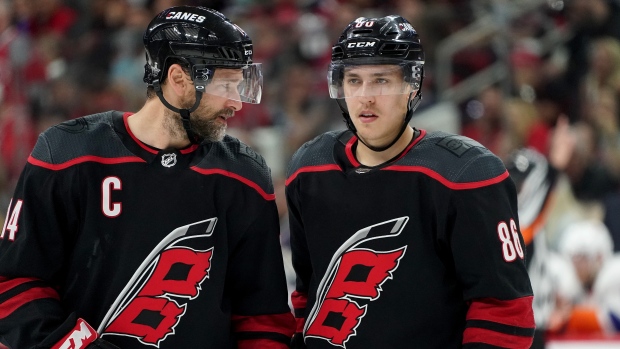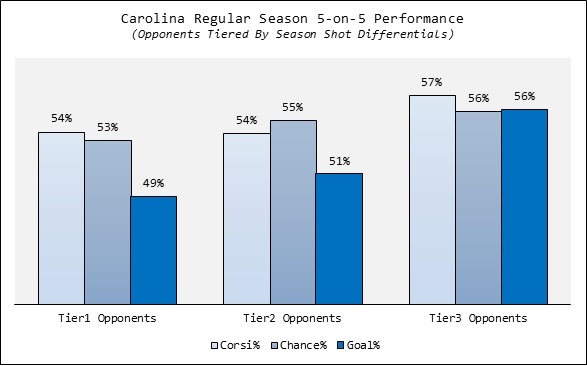May 9, 2019
Bruins present a unique challenge for upstart Hurricanes
Carolina’s emergence is the best story of the postseason, but they’re about to face one of the few teams that can match their ability to dominate the puck, Travis Yost writes.
By Travis Yost

The emergence of the Carolina Hurricanes is the best story of the 2018-19 Stanley Cup Playoffs.
The Hurricanes, who dispatched the defending champion Washington Capitals and New York Islanders in the first two rounds, are in in the Eastern Conference Final for the first time since the 2008-09 season.
How did Carolina make such an emphatic leap? The key piece was finding half-decent goaltending. The Hurricanes have been a speedy, up-tempo, puck-dominant team for years now, to the point I’ve often joked over the years that if you took away the nets and just looked at the run of play over the course of a game, Carolina would be the most dominant team in the NHL. (Carolina was eighth in the league in score-adjusted shot differential in 2016-17, first in 2017-18, and first again in 2018-19 – all data 5-on-5. The same exercise for save percentage has been grim. Over the same interval, they ranked 30th, 30th, and 14th. As soon as average goaltending was realized, Carolina took a gigantic step forward.)
Only one team has owned a bigger percentage of the shot share over the last three seasons than Carolina, and that’s their Eastern Conference Final opponent in Boston. It’s a matchup that presents a unique challenge for Carolina, particularly since their first two opponents this postseason ranked 15th and 22nd, respectively, in score-adjusted shot differential this year.
I theorized that the Islanders were a particularly poor matchup for the Hurricanes because the Islanders’ most decisive advantage (goaltending) erodes in a series where you expect to be so regularly outshot and outchanced by a superior possession team. But that cuts other ways too. If Carolina’s biggest advantage is the ability to own the run of play, will their weaknesses be exposed by one of the few teams that can match them on that front?
(Note: I have segmented the data because of the difference in games played against all other teams around the league. Boston, of course, would be a Tier 1 opponent.)

This is somewhat intuitive, but Carolina has more trouble, directionally speaking, turning its decisive shot advantages into goal advantages against better opponents. It’s also true that Carolina has trouble turning its decisive shot advantages into comparatively decisive scoring chance advantages. You can make this argument for most teams around the league, but it’s certainly worth wondering if a team like Carolina is disproportionately impacted by this – especially since this is a team that still scores on a very low percentage of their shots, relative to league norms.
That is an important distinction because the goaltending component – as one example – could explain why goal differentials don’t sync well with shot advantages against better opponents. But you can see that scoring chances lag (albeit less so) relative to shot differentials against higher-quality opponents, too. Goaltenders can’t impact scoring chances, at least in the way that most modern hockey types count the data.
Boston will pose an interesting challenge on that front. Forwards like Patrice Bergeron, Brad Marchand, and David Pastrnak are notoriously lethal at carrying the run of play, and this Bruins team – unlike Bruins teams of yesteryear – have competency throughout their top nine. Add in quality two-way skaters and puck movers on the blueline in Charlie McAvoy and Torey Krug, and you can start to see why it is so hard to take the puck back from this Boston team.
All in all: Boston is a different type of animal. They grind teams down through exhausting offensive zone cycles and relentless forechecking, forcing their opponents to play extended shifts in the defensive zone. Carolina’s rarely had to deal with that in this postseason, so this will be quite the curveball for a Hurricanes lineup that’s mastered the art of driving the puck north.
If they can maintain the defensive structure that worked so well against the Islanders and continue driving opponents into one-and-done opportunities when on the attack, the Hurricanes could pose serious problems for the Bruins. If we start seeing the defensive breakdowns that have intermittently plagued this team in the past, it’s the Bruins that will likely have the upper hand.
Enjoy the series!
Data via NaturalStatTrick

